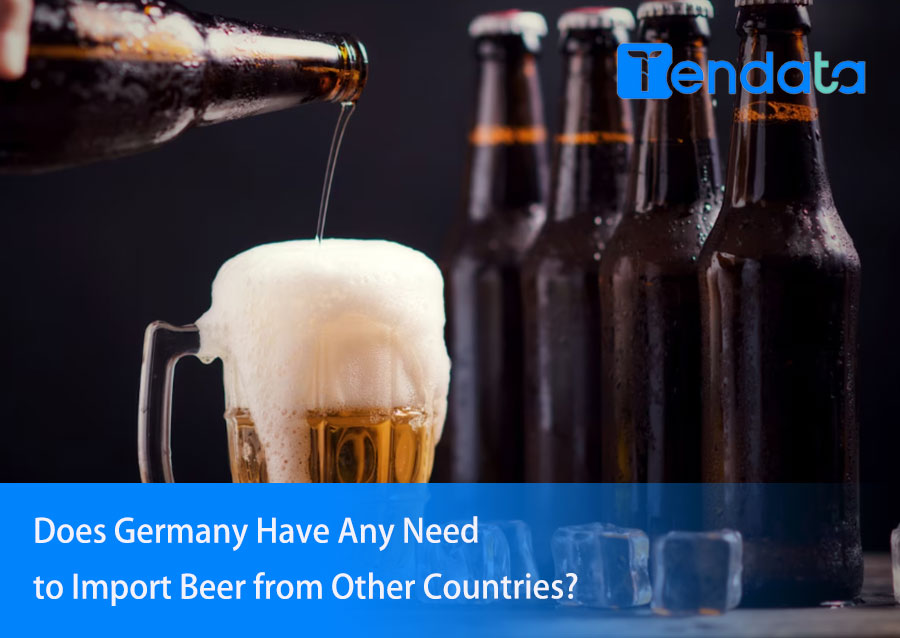 Import News
Import News
 08-12-2023
08-12-2023
When one thinks of Germany, beer often comes to mind. The country has a rich brewing tradition and is renowned for producing some of the world's finest beer. However, even with such a thriving local beer industry, German imports beer from other countries. In this article, Tendata will explore the dynamics of the German imports market, its imports, and the reasons behind the need to import German imports from other nations.

Introduction: The German Beer Culture
Germany's beer culture is deeply ingrained in its history and society. The nation is famous for its beer purity law, the "Reinheitsgebot," dating back to 1516, which regulates the ingredients that can be used in beer production. German imports beer is cherished worldwide for its quality, craftsmanship, and adherence to tradition.
The German imports Market
Germany boasts an extensive and competitive domestic beer market. It is home to numerous breweries, both large and small, producing a wide variety of beer styles, from pilsners and lagers to wheat beers and bocks. German imports beer consumption is not only about quantity but also about savoring the unique flavors and regional specialties.
Why Does Germany Import Beer?
Despite its thriving beer culture and local production, Germany imports German imports beer from other countries. Several factors contribute to this need:
1. Diversity of Beer Styles
While Germany produces an impressive array of beer styles, beer enthusiasts in the country have a growing interest in exploring international beer varieties. Imports allow Germans to enjoy the diversity of global beer offerings, including Belgian ales, Irish stouts, and American craft beers.
2. Craft Beer Revolution
The craft beer movement has gained momentum worldwide, and Germany has not been immune to its allure. Craft breweries from other countries introduce innovative and unique beer styles that appeal to consumers seeking new taste experiences.
3. Seasonal and Limited-Edition Beers
International breweries often release seasonal and limited-edition beers that create excitement among German consumers. These special releases may not be available locally, driving demand for German imports.
4. Niche Market
Some niche markets in Germany demand specific types of beer that may not be readily available domestically. German imports cater to these specialized tastes, ensuring consumers can access their preferred beer styles.
5. Exporting German Beer
While Germany imports German imports beer, it is also a significant exporter of its own beer brands. German imports beer enjoys global recognition, and exporting helps promote German culture and trade relations worldwide.
The Future of Beer Imports in Germany
The German beer market is evolving, driven by changing consumer preferences and a globalized world. Beer imports are likely to continue playing a role in satisfying the curiosity and demands of beer enthusiasts. As international beer styles become more accessible and popular in Germany, the need for German imports may even increase.
In conclusion, Germany, a country celebrated for its beer culture, does indeed import German imports beer from other nations. This practice reflects the evolving tastes of German consumers and their desire to explore a diverse range of beer styles. While local German breweries thrive, German imports contribute to the rich tapestry of beer choices available to beer lovers in this nation with a deep-rooted brewing tradition.
The Role of Customs Data
>>>Click to Get FREE ACCESS TO CUSTOMS DATA from 80+ Countries<<<
In global trade, it is crucial to recognize the significance of customs data. When customs data is effectively aligned with business development, it greatly enhances the volume of global trade operations. Below, Tendata will elucidate three key applications of import and export data:
1. Market Analysis
Analyzing market trends and frontiers involves assessing market demands across different regions and juxtaposing product prices. This facilitates the selection of target markets with high profitability and substantial demand. Simultaneously, by querying customs data, one can gain insights into product market distribution and changing trends, enabling timely adjustments to marketing strategies.
Tendata iTrader provides access to customs data from over 80 countries (>>>Click to GET FREE ACCESS TO CUSTOMS DATA from 80+ Countries<<<), along with business data from 198 countries and over 10 billion trade records. Through multidimensional aggregation and analysis of global market information such as buyers, suppliers, countries of origin, trading cycles, and trade ports, Tendata deeply dissects target markets. This enables the formulation of guiding marketing strategies, product strategies, and competitive strategies. It optimizes production and logistics systems, achieving precision targeting. (>>>Click to GET SAMPLE DATA ONLINE<<<)

2. Customer Development
Customer development is a widely used function that involves finding potential high-quality customers through product keywords, HS codes, or filtering based on transaction frequency, scale, traded products, and trade partners. Coupled with contact information, this approach facilitates direct engagement with buyers.
Tendata combines trade data from 208 countries, business data from 198 countries and regions, and internet data from 141 countries to create a comprehensive database. With instantaneous search results, global target customers are presented in 0.01 seconds (>>>Click to Apply for Free Trial Data<<<).

3. Customer Acquisition
Customer acquisition involves examining changes in customers' trade partners to understand whether they are engaging new suppliers and if there is a need to optimize current approaches. This can also be used to analyze peer-to-peer transactions and understand peer pricing. At times, data can reflect the customer situations of peers, aiding in customer acquisition.
Tendata's in-depth customer information assists in analyzing detailed buyer profiles and provides contact details for numerous high-level executives. This represents invaluable sales material (>>>Click to Apply for Free Trial Data<<<).
Today, Tendata from Shanghai shares the extended value brought by customs data. They eagerly anticipate gradually highlighting the value of utilizing these combinations of customs data in the subsequent data functionality services of global trade Link (>>>Click to Learn More<<<).
Category
Leave Message for Demo Request or Questions


 T-info
T-info T-discovery
T-discovery

 My
Tendata
My
Tendata Market Analysis
Market Analysis Customer
Development
Customer
Development Competitor
Monitoring
Competitor
Monitoring Customer Relationship
Customer Relationship





































































































































